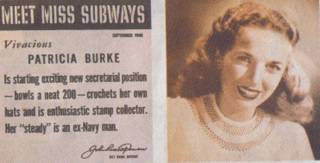
She bowls a neat 200

Bill "Jazz" Gillum, Look On Yonder Wall.
The boys were coming home, and it was time for the gigolos to head out. The singer here is no fool. Ever since V-J Day, he's been reading the paper every morning, seeing when the next ship of veterans is due to dock. The woman he's fooling around with says to pay it no mind, but the singer knows differently:
Now your man has been in the army,
Now I know that's awful tough
I don't know how many men that he done killed
But I think he done killed enough.
Hand him his walking cane, he's done.
Gillum was one of the architects of the Chicago blues, performing (and possibly writing--there is some controversy) standards like "Key to the Highway." In the end he remained a journeyman performer, never reaching the heights of contemporaries like Muddy Waters and Sonny Boy Williamson. Gillum's popularity in the postwar years waned and in 1966, just as he was attempting a comeback, Gillum was shot in the head during an argument. More on the ill-starred Gillum.
"Yonder Wall" was recorded in Chicago on Feb. 18, 1946, and featured "Big Maceo" Merriwether on piano and Leonard Caston on guitar. It was covered by everyone from Elmore James to the Rolling Stones (for whom it seems tailor-made) and can be found on the fourth volume of the great "When the Sun Goes Down" series of CDs: "That's All Right: The Secret History of Rock and Roll", a great collection of 1940s blues and R&B. Buy here.
No comments:
Post a Comment